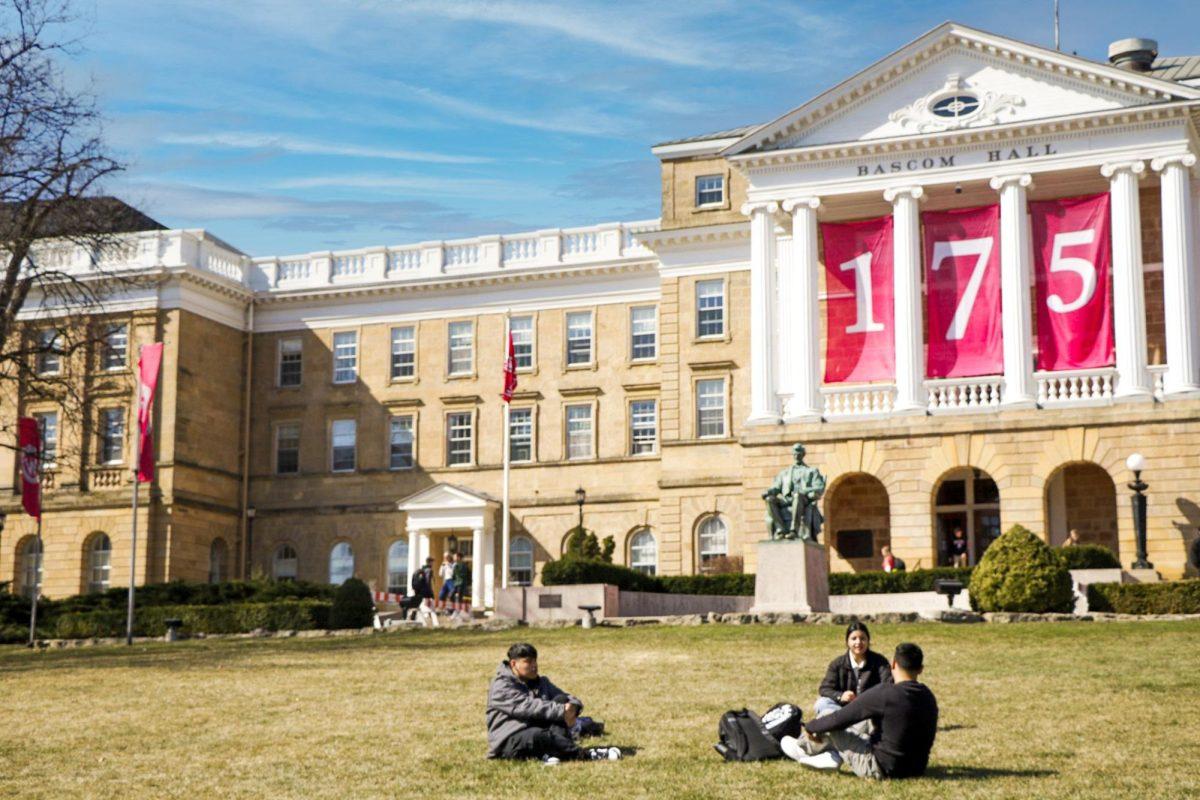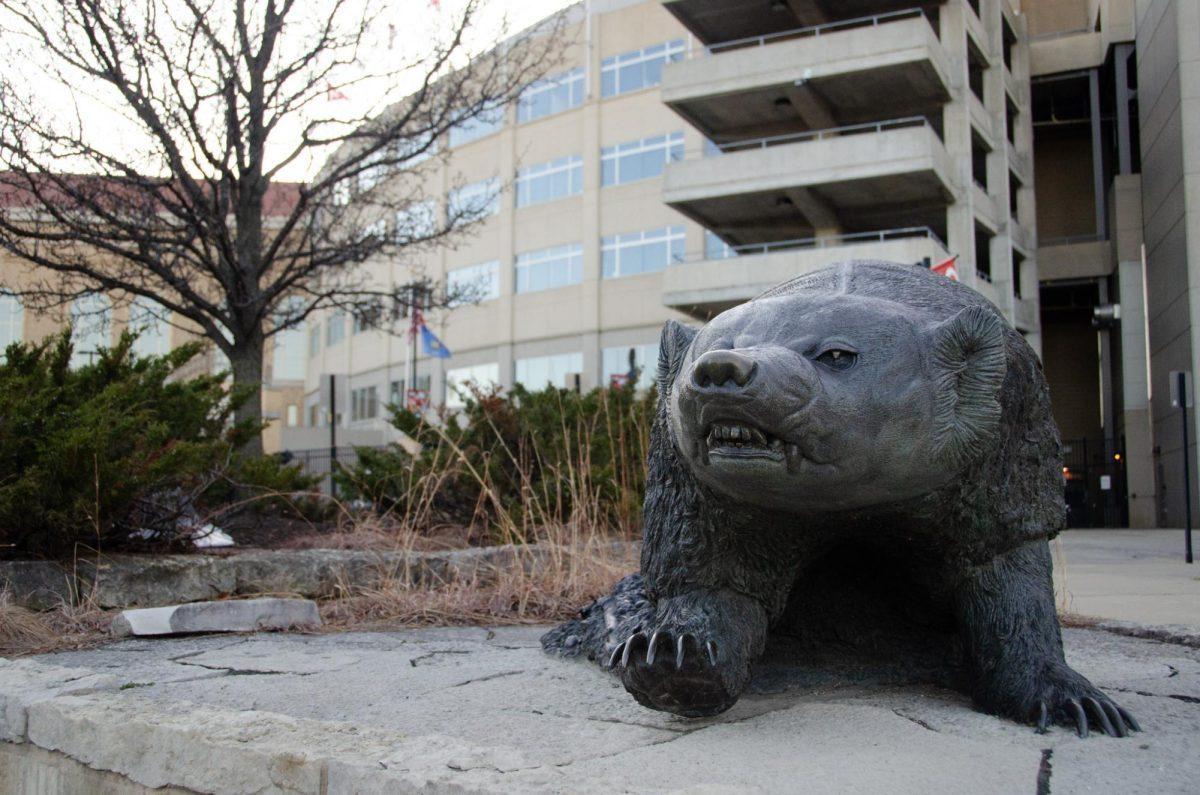Temperatures are warming up, and the last of the snow has finally melted, leaving behind the University of Wisconsin’s all-too-inviting grassy expanses. Grateful students are hitting Bascom Hill and other campus green spaces in droves.
What they might not know is that every year, the UW Physical Plant treats campus lawns with powerful herbicides scientifically linked to serious health risks — to which many students are exposed.
UW alumnus Clove Lilienthal knows the danger all too well, she says. Diagnosed with multiple sclerosis in 1991, Lilienthal believes the severity of her condition is in part due to cumulative exposure to lawn care chemicals.
Now bound to a wheelchair, with only partial use of one hand, Lilienthal motioned to a small picture frame on the opposite wall of her living room during a recent interview.
“I used to be a dancer. That was me,” she said matter-of-factly, adding she graduated from UW in 1979 with a degree in dance therapy.
The young woman in the photograph strikes a dramatic pose, an image of flexibility and strength. Lilienthal returned to UW to earn her master’s degree in dance and women’s studies, but was unable to complete her studies because of her illness, she said.
Lilienthal has since co-founded the Greater Madison Healthy Lawn Team with family physician Claire Gervais. The group’s formation was triggered by Lilienthal’s concern over her neighbors’ use of chemical lawn treatments.
A cause for concern
The Healthy Lawn Team’s mission to reduce pesticide use in the Madison area is now being echoed by a small group of passionate UW students hoping to make campus pesticide-free.
UW senior Melissa Greulich and sophomores Cordelia Cmiel and Jenna Rasmusson, working side by side with professors, have extensively researched the use of pesticides on campus and their potential health risks. The three students are currently circulating a petition to make the campus pesticide-free.
While Rasmusson began her research as an independent study project for a biology class, Greulich and Cmiel pursued their interest in pesticide use as interns for the UW chapter of the Wisconsin Student Public Interest Research Group.
Warren Porter, a professor in the UW zoology department with more than 20 years of work in molecular and environmental toxicology with a focus on child development, has been aiding the students’ research.
“I do know of many students of mine who have been exposed to pesticides in other situations and have become ill permanently as a consequence of that exposure,” Porter said, adding these illnesses have ranged from immune disorders to different types of cancer.
Porter said chemical pesticides are also likely to blame for steady increases in adverse effects on the learning abilities, immune systems and aggression levels in children.
“This planet cannot afford to raise a generation of children that are learning-disabled and hyper-aggressive,” Porter said. “And yet that is what we’re moving toward.”
Greulich said even for these risks alone, pursuing a pesticide-free environment is the responsible thing to do.
“These chemicals are so small that we don’t know if we’re getting them in our bodies but they are really easily absorbed through your skin, inhaled or ingested on foods that they’re sprayed on,” Greulich said. “They’re really everywhere in our environment, and we need to stop using them now, so in 10 years we don’t have these really bad effects on future generations.”
“It’s an issue that directly pertains to human health,” Rasmusson added. “So instead of being an environmental issue, which many people won’t be as interested in or as actively concerned about, it’s a direct health issue.”
Battle for Bascom Hill
The UW Board of Regents website on pesticide use lists totals of pesticides and fertilizers used on campus for every year since 1997, with the number of pounds and gallons of each product applied.
According to Gene Turk, the buildings and grounds superintendent for environmental services with the Grounds Management Department of UW’s Physical Plant, the university hires the private business TruGreen (formerly TruGreen ChemLawn) to spray a broadleaf herbicide called Tri-power one time in the fall of every year.
“They come in, and they get it done within probably two hours. That’s why we hire them, because they can get it in and get it done (faster than the grounds department),” Turk said, adding the application is generally done on Saturdays and signs are posted to warn the public.
The online campus pesticide data indicates 36 gallons of Tri-power were applied to campus grounds in 2007.
“It’s basically (applied in) areas that we think are maybe a higher priority than some areas or areas that maybe the turf would struggle if we didn’t take the broadleafs (weeds) out of it,” Turk said.
He said these areas include Bascom Hill, the Agriculture Hall lawns and green spaces along University Avenue.
Porter pointed out this policy targets many areas where students frequently sit.
“We’re needlessly exposing students in some cases to these pesticides that can alter their health,” he said.
The toxicological report for Tri-power, which contains the chemicals dicamba, mecoprop and MCPA, states that repeated overexposure may affect the “liver, kidneys, blood chemistry and gross motor functions.” The report also states that “the product contains substances that are considered to be probable or suspected human carcinogens.”
Through research for her independent study, Rasmusson found that TruGreen fertilizer, applied to campus last year in the thousands of pounds, is manufactured by Riverdale, the same company that manufactures Tri-power.
“The active ingredients in TruGreen (fertilizer) are the same as in Tri-power, but they’re a lot less concentrated,” Rasmusson said.
In addition to Tri-power, the grounds department applied other substances in 2007, including a gallon of Arbotect injected into campus elm trees, most of which are on Bascom Hill. The table also indicates that more than 50 gallons of Phyton, a bactericide and fungicide toxic to fish, were applied to campus grounds.
Also in 2007, nearly 80 gallons total of the herbicide Round-Up were applied to shrub beds on campus and in the Lakeshore Nature Preserve. According to the Healthy Lawn Team’s website, ingredients such as glyphosate in Round-Up are also highly toxic to fish and have been linked to spontaneous abortion in humans.
Around five years ago, Porter gave a presentation of his research to the grounds management department, according to Porter.
“I tried to show them that there are challenges to the university, because if students got ill as a result of exposures to these lawn chemicals, the university would be liable,” Porter said. “So what they did instead (of stopping pesticide use) was to hire an outside lawn company to do the spraying instead so that the lawn company would assume the liability if any claims were made.”
In addition, Porter said he suggested alternatives such as organic fertilizers and referred grounds management to the Healthy Lawn Team.
Turk said the grounds department didn’t put these alternatives into effect because they were impractical for an institution as large as UW.
“Those kinds of situations might work good at somebody’s home, but not on a campus,” he said.
UW zoology and limnology professor Stanley Dodson said alternatives could be practical given the right expectations.
“If your goal is the perfect golf course lawn, then that’s probably not true,” he said. “But if you want to have what I call a ‘professor lawn,’ with your dandelions here and there, some moss maybe on the edge, various plants in it, then [alternative fertilizers could be used] no problem.”
Dodson, who has researched storm water retention ponds in Dane County, found lawn chemicals can also have adverse effects on the bodies of water.
“If the watershed (area that drains into the water) is more than 25 to 30 percent lawn, then there won’t be aquatic vegetations, amphibians, snails, and things (like plankton) will be reduced, and fish growth is also reduced,” Dodson said, adding that he is now involved with a larger scale study that examines lakes.
Although he has no conclusive evidence, Dodson said it is possible Lake Mendota has been affected by pesticides used on campus.
Turk is positive the application of Tri-power by TruGreen poses no danger of chemical runoff into area waterways, since the application of the pesticides is well-monitored.
“They are instructed to stay a certain distance away from all the waterways,” Turk said. “We map it out with them every year, we meet with them, they go out with a grounds supervisor on site with them. … It’s not that we just say, ‘Here’s some money, go do what you want.'”
A university of diversity?
Turk said pesticides are used on campus for cosmetic reasons and to eliminate plants that compete with grass.
Dodson recommended different criteria for appraising campus green space.
“A pure green, uniform lawn is a sick lawn,” he said. “It’s not good for the water, it’s not good for the people, it’s not good for dogs that run on it, because the only way you can produce a pure green lawn is by using a lot of pesticides.”
Instead, Dodson explained that we should be aiming for different types of plants coexisting in the same green space.
Although the initiative to go pesticide-free just began this semester, some of the student body has taken notice.
Tyler Schappe, a UW freshman also relaxing on Bascom Hill last week, said he can see where the university is coming from.
“I understand that it’s to maintain the look of the University because they are trying to draw visual appeal,” Schappe said, adding he still doesn’t like the idea of pesticides on campus grounds. “I really had no idea,” he said.
Lilienthal thinks that though the trend of the uniform “golf course” certainly extends to large institutions like UW, it is an idea that has evolved in residential areas.
“There’s people that hate dandelions, and it’s just kind of a mindset that has grown up with suburban America,” Lilienthal said. “My lawn is green. … There’s all kinds of stuff growing in my lawn, but it’s green.”
‘Grassroots’ organizing: Finding a (pesticide-free) solution
Although Turk was unaware of the petition to make campus pesticide-free, the knowledge doesn’t worry him.
“These things come and go, as do students,” Turk said. “As with anything, there’s always somebody who may not necessarily agree with the approach that we’re using,”
Greulich, Cmiel and Rasmusson have gathered a total of nearly 200 signatures at two events thus far. They plan to continue recruiting people to support their cause when they officially propose the pesticide-free initiative to the University.
Student reactions to the initiative, Greulich and Cmiel said, have ranged from excitement to hesitation.
“It’s really important that we do a petition like this because, since it’s not something everyone talks about, the university wouldn’t necessarily know that students actually cared,” Cmiel said.
But after all the facts are laid on the table, the question remains: If pesticides pose serious health risks, why is there resistance to switch to alternatives?
Porter attributed it to habit.
“People are used to doing things one way, and sometimes it takes them awhile to decide to do something differently,” he said.
TruGreen does offer a natural, pesticide-free fertilizer option generally effective at inhibiting dandelion growth, but according to Lilienthal, it may not yield results on par with chemicals.
“It might be more work, so that might be discouraging for people who just want a chemical company to come out five times a year and give a little spray,” Lilienthal said.
But more work, even initially, may be too much for an institution the size of UW to handle, Turk says.
“If somebody has a treatment that would do the same thing as the herbicide does and does it in a timely fashion, then we certainly would consider it,” Turk said. “We don’t have the manpower to do these kinds of things, and that’s why we hire TruGreen.”
“You can do something as simple as vinegar and water and lemon juice to kill a dandelion, and that doesn’t hurt anyone,” Greulich said.














